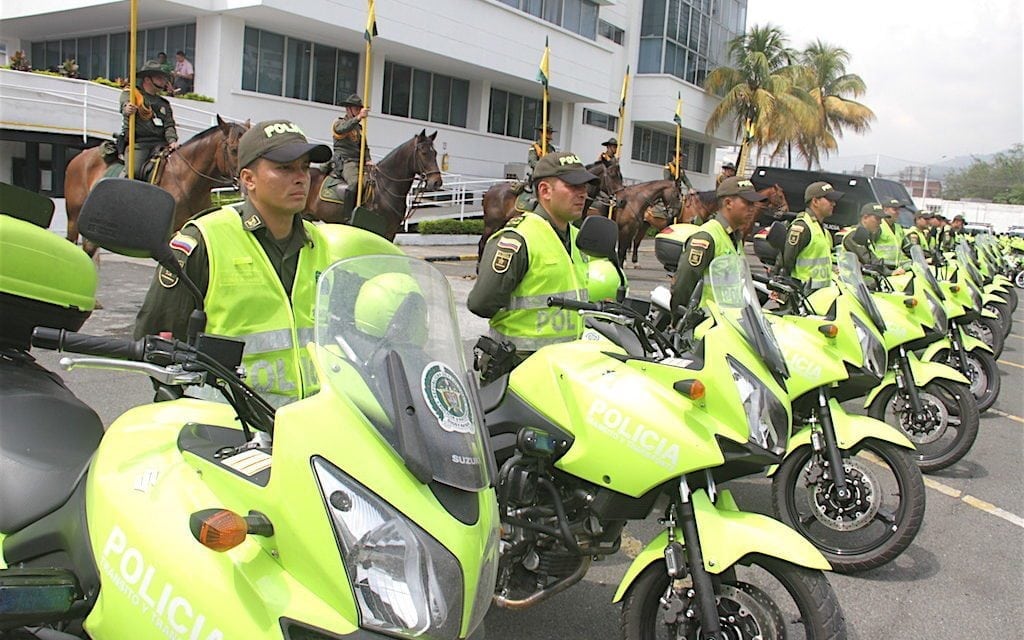We look at the penalties for violating the quarantine in Medellín and the Aburrá Valley. We advise all readers to follow the rules of the strict quarantine in Medellín and the Aburrá Valley. The penalties for violating the quarantine are very stiff including possible prison time and high fines.
Medellín Mayor Quintero announced on July 13, that “we” have decided Medellín and the rest of the Aburrá Valley will enter a phase with four days of working and three days of total closing with a strict quarantine. This was a decision by the government of Antioquia.
This is very strict quarantine on the weekends and holidays only has one exception for leaving the house for most people – to walk pets like dogs and cats.
Throughout the Aburrá Valley, starting on Friday, July 17, at 00:00 hour (midnight on Thursday) and until midnight of the holiday on Monday July 20, over this long weekend there is a strict quarantine for four days in Medellín and the Aburrá Valley.
However, we have seen posts from foreigners on Facebook bragging about going out this weekend in places like Provenza and Parque Lleras in El Poblado. Also, several Medellin Guru readers have asked about the penalties for violating the quarantine.
So, we now look at the penalties for violating the quarantine in Medellín.

The penalties for violating the quarantine can include high fines
Penalties for Violating the Quarantine in Medellín and the Aburrá Valley
According to decree issued by the Antioquia Government, the penalties for violating the strict quarantine in Medellín and the Aburrá Valley include:
- Fines provided for in article 2.8.8.1.4.21 of decree 480 of 2016
- Criminal sanction provided in section 368 of the Penal Code
- The application of the measures in law 1801 of 2016
The fines in article 2.8.8.1.4.21 of decree 480 of 2016 may be successive and their total value may be up to a sum equivalent to 10,000 legal minimum daily wages. The minimum legal daily wage in 2020 in Colombia is 25,260 pesos.
So, the fines for violating the quarantine can be successive and can be up to a total of 252.6 million pesos.
The criminal sanction under section 368 of the Colombian Penal Code says: “anyone who violates a sanitary measure adopted by the competent authority to prevent the introduction or spread of an epidemic, shall be in prison for four (4) to eight (8) years.”
Law 1801 of 2016 provides the Colombian government with extraordinary power to prevent risk in case of an emergency including epidemics.
Even with stiff potential penalties, there are many people out there violating the strict quarantine in Medellín and the Aburrá Valley over the past long weekend.
According to Minuto30, the Metropolitan Police of the Aburrá Valley released the consolidated results for appearances, interventions and captures for non-compliance with the strict quarantine in the Aburrá Valley between Friday, July 17 and the morning of Sunday, July 20:
- 2,418 for violating mandatory preventive isolation
- 289 for not using a face mask
- 122 for consumption of alcoholic beverages
- 66 for crowding of people
Also, the authorities have intervened in 156 parties over the long weekend.

Police in Medellín, photo by Colombia National Police
What is Permitted During the Strict Quarantine Days in Medellín and the Aburrá Valley?
According to the decree issued by the Antioquia Government, people who qualify within any of the following 28 categories are exceptions to the strict quarantine in Medellín and the Aburrá Valley:
- Assistance and provision of health services.
- Assistance and care for children, adolescents, people over 70 years of age, people with disabilities and patients with special treatments that require assistance from trained personnel.
- Due to force majeure or fortuitous event.
- The tasks of the medical missions of the Organización Panamericana de la Salud (OPS) and of all international humanitarian and health organizations, the provision of public and private professional, administrative, operational, and technical health services.
- The chain of production, supply, storage, transportation, marketing and distribution of medicines, pharmaceuticals, supplies, cleaning products, disinfection and personal hygiene for homes and hospitals, equipment and devices of health technologies, as well as maintenance and support to guarantee the continuous provision of health services.
- Activities related to emergency services, including veterinary emergencies.
- Funeral services, burials and cremations.
- The chain of production, supply, storage, transportation, commercialization and distribution of: (i) inputs to produce basic necessities; (ii) basic necessities -food, beverages, medicines, medical devices, cleaning, cleaning, and goods of ordinary consumption in the population-, (iii) laboratory reagents, and (iv) food and medicine for pets, and others elements and goods necessary to attend the health emergency, as well as the supply chain related to the production of these goods.
- The chain of sowing, fumigation, harvesting, production, packaging, packaging, import, export, transport, storage, distribution and marketing of seeds, inputs and agricultural, fish, livestock and agrochemical products -fertilizers, pesticides, fungicides, herbicides; and animal feed, maintenance of animal health, the operation of primary and secondary food processing centers, the operation of the commercialization infrastructure, major and minor irrigation for population and agricultural water supply, and technical assistance. The logistics and transportation of the above activities will be guaranteed.
- Marketing of essential products in markets, stores, warehouses, wholesale and retail supermarkets, retail markets and in establishments and commercial premises will be carried out through electronic commerce platforms and/or for home delivery.
- Activities of the public servants and contractors of the State that are strictly necessary to prevent, mitigate and attend to the health emergency due to the coronavirus (covid-19), and guarantee the operation of the essential services of the State.
- Activities of the staff of diplomatic and consular missions.
- Activities of the Military Forces, the National Police and State security agencies, as well as the military and defense industry.
- Intervention of civil, public and construction works, which, due to the state of progress of the work, present risks of technical stability, threat of collapse or require structural strengthening actions or those that due to their characteristics are of strategic interest to Colombia.
- Construction of health infrastructure strictly necessary to prevent, mitigate and attend to the health emergency due to the coronavirus (covid-19).
- Air and airport operation of cargo transportation, in humanitarian emergencies and fortuitous cases or force majeure.
- Commercialization of the products of gastronomic establishments and establishments (restaurants) through electronic commerce platforms or by home delivery.
- Activities of the hotel industry to serve its guests, which are strictly necessary to prevent, mitigate and attend to the health emergency caused by the coronavirus (covid-19).
- Operation of critical infrastructure – computers, computer systems, communication networks, data and information whose destruction or interference can weaken or impact the security of the economy, public health or a combination of them.
- Operation and operation of call centers, contact centers, technical support centers and data processing centers that provide services in the national territory and electronic commerce platforms.
- Operation of the provision of private security and surveillance services, prison and prison services and companies that provide cleaning and cleaning services in public buildings, common areas of buildings and buildings in which activities are carried out What this article is about.
- Activities necessary to guarantee the operation, maintenance, storage and supply of the provision of: (i) public services of aqueduct, sewerage, electric energy, public lighting, cleaning (collection, transportation, use and final disposal, recycling, including biological or sanitary waste); (ii) of the logistics chain of inputs, supplies for the production, supply, import, export and supply of hydrocarbons, liquid fuels, biofuels, natural gas, liquefied petroleum gas (iii) of the logistics chain of inputs, supplies for the production, supply, import, export and supply of minerals, and (iv) Internet and telephone service.
- Provision of banking and financial services, of payment operators, operations of games of luck and chance in the form of new and territorial permanent bets, chance and lottery, credit bureaus, transportation of securities, except, for all, direct attention to the public.
- Operation of the postal, courier, radio, television, press and distribution services of the media.
- Supply and distribution of basic necessities – food, beverages, medicines, medical devices, hygiene, cleaning, and goods for ordinary consumption – in the population under social programs of and of private persons.
- Activities of the inter-religious sector related to institutional emergency programs, humanitarian, spiritual and psychological aid.
- Activities strictly necessary to operate and carry out the essential maintenance of companies, industrial plants or mines, of the public or private sector, which due to the nature of their production process require to maintain their operation uninterruptedly.
- Operation of family police stations and police inspections, as well as the users of these, only for cases of extreme urgency.

Computer generated image of COVID-19, photo by Felipe Esquivel Reed
Medellin Guru’s Coronavirus Series
Medellin Guru has a series of articles about the coronavirus pandemic and the impacts in Colombia: Also, these articles are being kept up-to-date, as this is a fast-moving topic:
- Humanitarian Flights from Colombia to the U.S. and Other Countries
- Medellín Starts Free COVID-19 Tests on the Medellín Metro
- New COVID-19 Preventive Measures in Medellín to Contain the Pandemic
- Penalties for Violating the Quarantine in Medellín are Stiff
- COVID-19 Orange Alert in Bogotá: New Lockdowns in Bogotá
- Medellín Starts to Lift the Quarantine: Enters Smart Isolation Phase
- Colombia Started to Lift the Quarantine – What Does this Mean?
- Coronavirus: When Will the Quarantine Be Lifted in Colombia?
- Colombia Starts to Lift the Quarantine in COVID-19 Free Areas
- Colombia Quarantine: Nationwide Quarantine Extended to September 1
- Coronavirus in Colombia: Myth vs Reality – Current Status
- Coronavirus Hospitalization in Colombia: Myth vs Reality
- Are Medellín and Antioquia Winning the Coronavirus Battle?
- 23 Cities with a Major Increase in Coronavirus Cases in Colombia
- Colombia Coronavirus Death Rate: What are the Chances of Dying?
- Coronavirus: When Will Things Return to Normal in Colombia?
- COVID-19 Testing in Colombia: Realty About Coronavirus Testing
- Life as an Expat: During Medellín’s Coronavirus Quarantine
- Colombian Visa Process Changes: Due to Quarantine and Coronavirus
- Medellín Coronavirus Closures – What is Closed in Medellín?
- Pico y Cedula: A Restriction for Grocery Shopping in the Aburrá Valley During the Quarantine
- Pico y Cedula in Colombia: Which is Strictest Out of 5 Largest Cities?
- Medellín Quarantine Starts on March 20 for Four Days
The Bottom Line: Penalties for Violating the Quarantine in Medellín
The bottom line is that Colombia had 197,278 coronavirus cases as of July 19, 2020. This is why several cities in Colombia had quarantines that started on March 20 and Colombia is doing a nationwide quarantine in Colombia that started on March 24 until August 1.
The new preventative measures put in place by Medellín and the Aburrá Valley include a very strict quarantine on the weekends and holidays over a period of four weeks.
We strongly recommend to readers don’t violate this strict quarantine. Breaking the quarantine rules is against the law and the penalties can be very stiff.
Also, keep in mind we are foreigners and guests in Colombia. Do the right thing, stay home and follow the quarantine rules.
Stay safe! And protect yourself from COVID-19 by:
- Staying home as much as possible.
- Avoiding close contact with people who are sick.
- Put distance between yourself and other people when you are out.
- Avoid touching your eyes, nose, and mouth with unwashed hands.
- Wash your hands often with soap and water for at least 20 seconds.
- Wear a face mask.
Sign up for the Free Medellin Guru Newsletter – You can see all of the previous Medellin Guru weekly email newsletters and sign up here.

